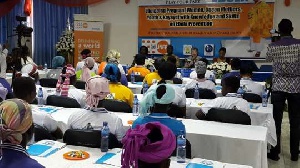Dr Babatunde Ahonsi, United Nations Fund for Population Activities (UNFPA) Representative in Ghana says, the country is considered to be at risk of contacting the Ebola Viral Disease (EVD).
He said Ghana serves as a transit for many travellers to Africa and the Globe.
He also noted that the country has communities with relatives from the affected countries including those currently living in refugee camps in Ghana.
Dr Ahonsi was speaking at the launched of the UNFPA training partnership with the Hope For Future Generation (HFFG) and the Ministry of Health on the Ebola Viral and its prevention.
The training intend to build the capacity of queen mothers, pregnant women, the youth and female head porters (Kayayei) on the EVD and its prevention in the UNFPA seven focus operational regions.
The regions are Northern, Upper East and West, Brong- Ahafo, Ashanti, Central and Volta regions.
He said Ebola has killed thousands of people in West Africa and that many people and communities remain skeptical and uninformed about the importance and practical measures to protect themselves from the virus.
Dr Ahonsi said Ghana wants to “Keep Ebola at Zero” and that the UNFPA as part of the UN system-wide approach to support the national Ebola preparedness and response in undertaking this training programme in collaboration with the partners.
He said with the incident of new cases of the Ebola in Sierra Leone, it is imperative that sensitisation continues in a bid to inform individuals, families and communities in clear practical terms of the way in which they could minimise the risk of contracting the disease.
The resident Representative noted that the real dialogue with and engagement of individuals, families and stakeholders in communities could overcome fear and reluctance to alert surveillance teams to potential Ebola cases.
He said it is the expectation that equipping the target groups with knowledge and skills for Ebola prevention and preparedness would cause a rippling effect on families and communities.
“Community engagement and social mobilisation is central to Ebola prevention and response considering the epidemiology of the disease.”
Ms Christine Evans-Klock, United Nations Resident Coordinator said the training would help the participants to adopt practical knowledge and skills in preventing the contracting of the disease.
She said Ghana could not place a comprehensive Ebola prevention plan, but then requested the UN to provide the country with technical support in dealing with the prevention.
Madam Cecilia Lodono-Senoo, the Executive Director of HFFG said the training would create the awareness of Ebola among the participants and equipped them with the knowledge on its prevention.
She said the participants especially the Kayayei are vulnerable and must be train with the requisite skills of preventing the disease as they are expose to all kinds of threats of diseases at the market places where they work.
Madam Lodonu-Senoo said the HFFG had organized many workshops and had partner with the Ghana Health Service to trained community volunteers on Ebola prevention in our communities near Ghana’s borders of neighbouring countries.
Dr Hafiza Tahir, Director of Policy Planning Monitoring and Evaluation of the Ministry of Health on behalf of the Health Minister, Mr Alex Segbefia said the Government of Ghana and for that matter the ministry of health last year spent much of its budget resources to prevent the Ebola Viral from entering the country.
She said in view of that, the President John Dramani Mahama instituted a inter-ministerial coordinating committee of Ebola prevention and source for funds to build an Ebola response units in the Northern, Middle and Southern belts of the country.
Dr Tahir said Ghana is supporting its neighbouring countries who are affected by the viral with technical and human resource to combat the disease.
She said training instituted by the UNFPA is laudable and timely and urged the participants to be ambassadors of the Ebola Viral prevention programme by educating the public on the disease and its prevention.
Health News of Friday, 18 September 2015
Source: GNA

















